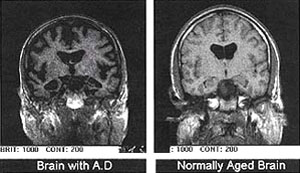Largest-ever Alzheimer's gene study underway

The genetics underlying late-onset Alzheimer’s disease could soon be revealed thanks to a collaboration of leading UK experts. The team, led by scientists at Cardiff University, has received £1.3 million from the Wellcome Trust, the UK’s largest medical research charity, to scan the entire human genome in search of the genes that predispose people to or protect them from developing the disease.
According to the Alzheimer’s Research Trust, there are over 700,000 people currently living in the UK with dementia, of which Alzheimer’s is the most common form. This figure is expected to double within the next twenty years. Yet, currently, only £11 is spent on UK research into Alzheimer’s for every person affected by the disease, compared to £289 for cancer patients.
Now, a team led by Professor Julie Williams from Cardiff University will use a technique known as “genome-wide association scanning” to analyse DNA samples taken from 14,000 people – 6,000 with late-onset Alzheimer’s disease and 8,000 healthy “control” samples from the UK and US – to identify common genetic variations that increase the risk of the disease.
“Alzheimer’s is a genetically-complicated story involving many genes, so we need large sample sizes to make sure any genetic links that we find are not mere coincidence. With access to 14,000 DNA samples, our study is the largest genetic study ever to look at Alzheimer’s and will undoubtedly produce some valuable insights into what causes this devastating illness.
“It’s very likely that we will find some unexpected associations. We know already that certain genes are involved in more than one form of dementia and that even genes that affect cholesterol level can be a risk factor for Alzheimer’s. We need to build a complete picture of the different pathways that lead to the disease. With this knowledge, we should, in time, be able to derive tangible clinical benefits.”
Professor Julie Williams from Cardiff University
Genome-wide association scanning is a powerful technique involving studying 500 000 genetic markers across the human genome. Work on genotyping the DNA samples – in other words, screening for the particular genetic mutations that are linked to Alzheimer’s disease – will be performed by Dr Panos Deloukas’ group at the Wellcome Trust Sanger Institute. Dr Deloukas says: “This study has the power to detect important variants predisposing to this devastating disease.”
“Alzheimer’s disease is a major burden on our society and this burden will only increase as our population ages. It is essential that we develop our understanding of the underlying causes of the disease, and genome-wide association scans offer a powerful tool to do just this.”
Professor Richard Morris, Head of Neurosciences and Mental Health at the Wellcome Trust, which is funding the study
The project has been welcomed by Rebecca Wood, Chief Executive of the Alzheimer’s Research Trust.
“This is an exciting project that could lead to real progress in our understanding of Alzheimer’s. We are delighted to see this research receive such a huge boost after we funded the initial collection of tissues together with the Medical Research Council.
“Alzheimer’s is a devastating disease which urgently needs more research funding. It is fantastic that the Wellcome Trust is supporting such a significant project that has the potential to improve the lives of the 420,000 people with Alzheimer’s in the UK and their families.”
Rebecca Wood Chief Executive of the Alzheimer’s Research Trust
More information
Selected websites
Cardiff University
Cardiff University is recognised in independent government assessments as one of Britain’s leading teaching and research universities. Founded by Royal Charter in 1883, the University today combines impressive modern facilities and a dynamic approach to teaching and research. The University’s breadth of expertise in research and research-led teaching encompasses: the humanities; the natural, physical, health, life and social sciences; engineering and technology; preparation for a wide range of professions; and a longstanding commitment to lifelong learning. Cardiff is a member of the Russell Group of Britain’s leading research universities.
Alzheimer's Research Trust
The Alzheimer’s Research Trust is the UK’s leading dementia research charity. The charity funds world-class research to fund ways to cure, prevent and treat Alzheimer’s and related diseases.
The Wellcome Trust Sanger Institute
The Wellcome Trust Sanger Institute, which receives the majority of its funding from the Wellcome Trust, was founded in 1992. The Institute is responsible for the completion of the sequence of approximately one-third of the human genome as well as genomes of model organisms and more than 90 pathogen genomes. In October 2006, new funding was awarded by the Wellcome Trust to exploit the wealth of genome data now available to answer important questions about health and disease.
The Wellcome Trust
The Wellcome Trust is the largest charity in the UK. It funds innovative biomedical research, in the UK and internationally, spending around £500 million each year to support the brightest scientists with the best ideas. The Wellcome Trust supports public debate about biomedical research and its impact on health and wellbeing.


